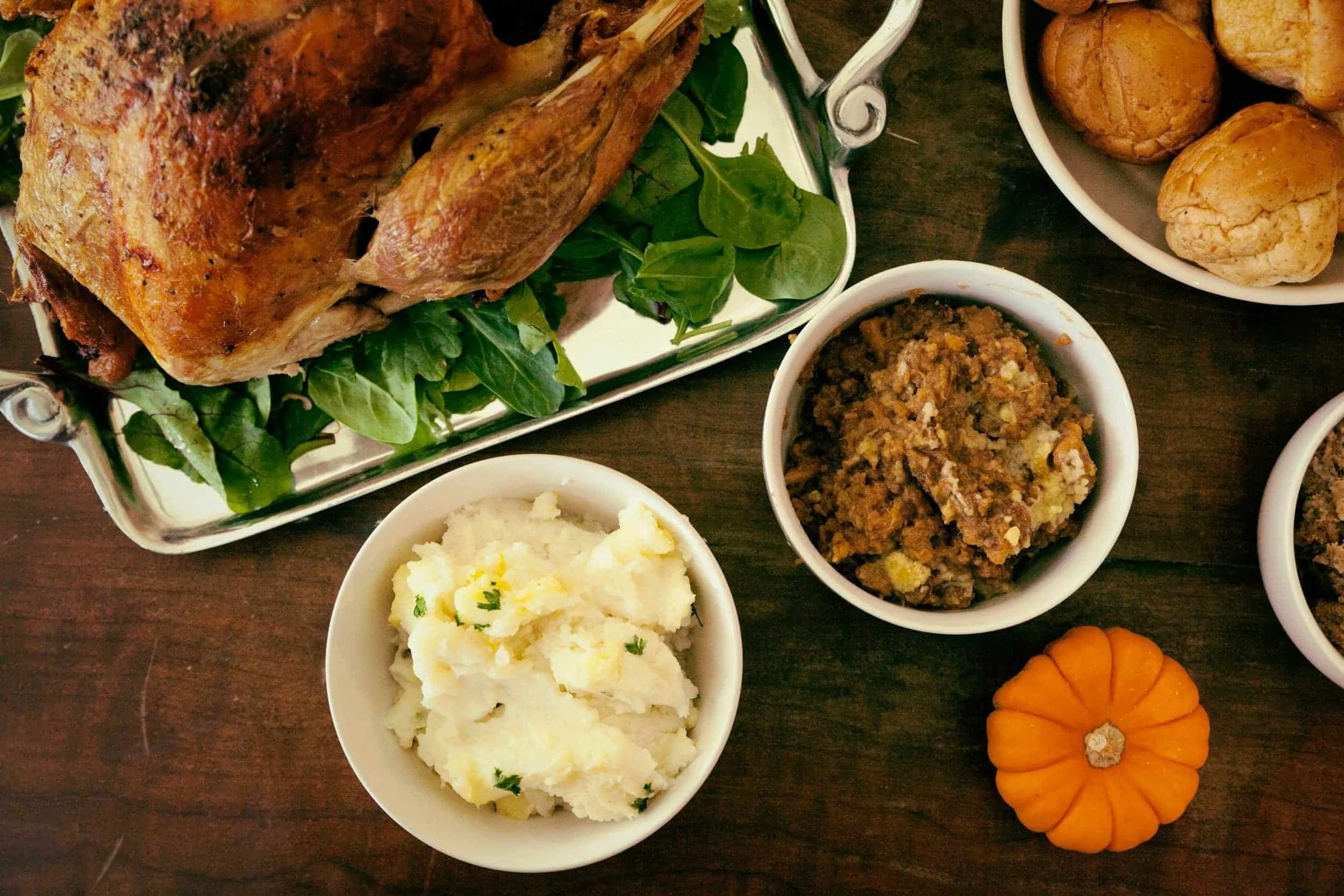Digestive Harmony for Thanksgiving: Spleen & Food Stagnation
Thanksgiving arrives with abundant blessings and, often, abundant digestive distress. That uncomfortable fullness, bloating, fatigue, and sluggish feeling after the feast is so common we've normalized it as part of the holiday experience. But Traditional Chinese Medicine offers both an explanation for this post-feast malaise and practical strategies to enjoy your celebration without the digestive consequences that can linger for days.
The Spleen-Stomach Partnership in TCM
In Western medicine, the spleen is primarily understood as part of the immune system. In TCM, however, the spleen plays a central role in digestion, working in partnership with the stomach to transform food and drink into qi (vital energy) and blood. Think of the stomach as a pot that receives and "rots and ripens" food, while the spleen acts as the fire beneath, extracting nutrients and transporting them throughout the body.
When functioning optimally, this spleen-stomach partnership efficiently processes whatever you eat, distributing nourishment and eliminating waste. But when overwhelmed—by excessive quantities, difficult-to-digest combinations, or weak digestive fire—food stagnation occurs. Rather than being transformed into usable energy, food sits undigested, creating the bloating, discomfort, and exhaustion that plague so many Thanksgiving celebrants.
Understanding Food Stagnation
Food stagnation manifests with recognizable symptoms: abdominal fullness and distension, belching with a sour or food taste, acid reflux, nausea, decreased appetite, foul-smelling gas, and pronounced fatigue. You might also notice a thick coating on your tongue—a classic TCM diagnostic sign that food isn't being properly transformed.
Several factors contribute to food stagnation during holiday meals:
Quantity: The sheer volume of Thanksgiving dinner overwhelms the spleen's capacity to process it all efficiently, particularly when we eat past the point of comfortable fullness.
Variety: Mixing multiple proteins, starches, rich fats, and sugary desserts requires different digestive processes occurring simultaneously, straining the system.
Temperature: Cold beverages and chilled foods (like cranberry sauce straight from the refrigerator) literally dampen the spleen's digestive fire, slowing the entire process.
Timing: Eating late in the day, when digestive capacity naturally wanes, or eating while stressed or rushed impairs the spleen-stomach function.
Inherent Weakness: Some people naturally have weaker spleen qi, making them more susceptible to stagnation even with moderate indulgence.
Prevention: Supporting Your Spleen Before the Feast
The best treatment for food stagnation is prevention. Several strategies can prepare your digestive system for the holiday challenge:
Eat Lightly Earlier: Arrive at Thanksgiving dinner with gentle appetite rather than ravenous hunger. Skipping breakfast and lunch to "save room" actually weakens digestive fire and leads to overeating. Instead, have a light breakfast with easily digestible foods like oatmeal or rice porridge with ginger.
Warm Your Digestion: Drink warm ginger tea throughout the morning. Ginger strongly supports spleen function and helps prepare the digestive system for the work ahead. Avoid cold beverages before and during the meal.
Move Your Qi: Take a morning walk or do gentle stretching. Physical movement helps qi circulate, supporting digestive function and reducing the likelihood of stagnation.
Herbal Preparation: Taking digestive herbs like hawthorn berry (shan zha) or a traditional formula like Bao He Wan (Preserve Harmony Pill) before a large meal can provide additional support, though consult with a practitioner about appropriateness for your individual constitution.
During the Meal: Mindful Eating Strategies
How you eat matters as much as what you eat:
Chew Thoroughly: Digestion begins in the mouth. Chewing slowly and thoroughly initiates the transformation process and signals your stomach to prepare appropriate digestive secretions. In TCM terms, you're supporting the "rotting and ripening" function.
Choose Temperature Wisely: Favor warm foods and room-temperature dishes over cold items straight from the refrigerator. If you must have cold cranberry sauce, take a small portion and let it warm slightly on your plate near hot foods.
Drink Warm, Not Cold: Replace ice water with warm water or tea. Cold liquids directly damage spleen yang—the fire that powers digestion. Even room temperature is preferable to iced beverages.
Respect Fullness: In TCM, meals should fill the stomach only 70-80% full, leaving space for the churning and transformation process. When you feel satisfied but not stuffed, stop eating regardless of what remains on your plate.
Sequence Matters: Begin with easier-to-digest items like vegetables and soups before moving to dense proteins and starches. End with the smallest portions of heavy, sweet desserts.
After-Feast Recovery: Dispersing Stagnation
Despite best intentions, overindulgence happens. TCM offers several effective remedies for food stagnation:
Hawthorn Berry (Shan Zha): This fruit specifically addresses meat stagnation and fatty food accumulation. Hawthorn tea or supplements taken after the meal help disperse stagnation and reduce that overstuffed feeling.
Pu-erh Tea: This fermented tea cuts through grease, aids fat digestion, and gently moves stagnant food. It's traditional in Chinese culture to drink pu-erh after heavy meals for precisely this reason.
Radish: Cooked radish strongly moves qi downward, relieving bloating and promoting digestion. A simple radish soup the day after Thanksgiving can provide significant relief.
Gentle Movement: The traditional post-Thanksgiving walk isn't just custom—it's medicine. Gentle movement helps circulate qi, supporting the spleen's distributive function and preventing food from stagnating. Avoid vigorous exercise immediately after eating, but a 15-20 minute leisurely walk works wonders.
Acupressure: Massage Stomach 36 (four finger-widths below the kneecap, one finger-width lateral to the shin bone) and Spleen 6 (four finger-widths above the inner ankle bone). These points strengthen digestive function and help resolve stagnation.
Fasting or Light Eating the Next Day: Give your spleen time to clear the backlog. A day of simple rice porridge, steamed vegetables, or broth allows your system to catch up without adding more work.
Long-Term Spleen Support
If you regularly experience digestive issues—not just at Thanksgiving—your spleen may need ongoing support:
Warming Foods: Favor cooked over raw, warm over cold. Root vegetables, warming spices (ginger, cinnamon, cardamom), and easily digestible grains like rice strengthen spleen function.
Avoid Damp-Producing Foods: Excessive dairy, greasy foods, sweets, and cold/raw foods create dampness that burdens the spleen. Moderation is key.
Regular Meal Times: The spleen thrives on routine. Eating at consistent times each day supports optimal function.
Stress Management: Worry and overthinking directly damage the spleen in TCM theory. Practices that calm the mind—meditation, gentle yoga, time in nature—indirectly support digestion.
This Thanksgiving, honor the abundance while respecting your body's capacity. By understanding and supporting your spleen-stomach partnership, you can enjoy the feast and feel well afterward—creating a truly grateful digestive system.



